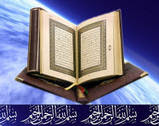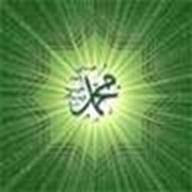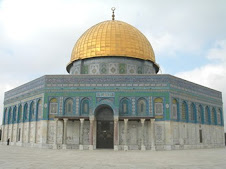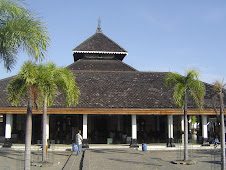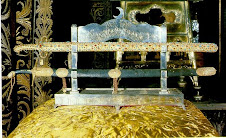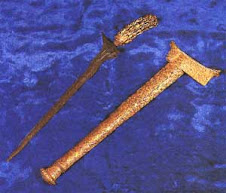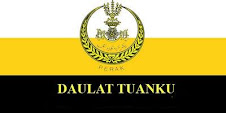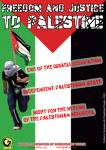We wish all Muslim Brothers & Sisters in Malaysia and all over the World "Eid Al-Fitr Mubarak, Kullu 'Am Wa Antum Bi Khair".
We seek your forgiveness physically & spiritually, inshaAllah.






Saturday, September 19, 2009
Eid Al-Fitr Mubarak !!!!!!!!!
Posted by
Bukit Chandan
at
10:17:00 PM
1 comments
![]()
![]()
Saturday, April 11, 2009
Islamic Jurisprudence - Part 2 (The Sources Of Islamic Law)




ISLAMIC JURISPRUDENCE – PART 2 (THE SOURCES OF ISLAMIC LAW)
There are 2 sources of Islamic Law:
1. Main Sources
2. Interpreted Sources
Main Sources
1. Holy Quran
2. ‘As-Sunnatun Nabawiyah’ (Prophetic Traditions)
Among the proofs of the Main Sources are:
1. Allah s.w.t. says in the Holy Quran which means,
“O ye who believe! Obey Allah, and obey the Messenger, and those charged with authority among you. If ye differ in anything among yourselves, refer it to Allah and His Messenger, if ye do believe in Allah and the Last Day: That is best, and most suitable for final determination.”
[Chapter An-Nisa’: Verse 59]
“So take what the Messenger assigns to you, and deny yourselves that which he withholds from you. And fear Allah; for Allah is strict in Punishment.”
[Chapter Al-Hashr: Verse 7]
2. Rasulullah s.a.w. said which means,
“I leave for you two items (heritage), you will not be astray as long as you still hold on to them, that is, the Book of Allah and the Traditions of His Messenger.”
[Hadith]
The Meaning Of The Holy Quran
The Holy Quran is the words of Allah s.w.t., which are miracles that have been revealed to His Messenger Prophet Muhammad s.a.w., which are written in book form, which are reliably transmitted to all mankind with the pronunciations and meanings in the Arabic language and its recitations are made as acts of devotion to Allah s.w.t. (‘Ibadah’).
Synopsis
The important matters that can be taken in the above mentioned meaning of the Holy Quran are:
1. The Holy Quran is the words of Allah s.w.t. to His Messenger Muhammad s.a.w. only. The original genuine texts of Torah, Zabur, Bible and others are not the Holy Quran. Indeed, all of them are the words of Allah s.w.t.
2. The Holy Quran is the words of Allah s.w.t. that has been compiled into a book form in the Arabic language. Any form of interpretation and translation in any language is not the Holy Quran.
3. The Holy Quran is made as an act of devotion to Allah s.w.t. (‘Ibadah’) when recited. Collections of ‘Hadith Nabawi’ and ‘Hadith Qudsi’ are not the Holy Quran.
4. The Holy Quran is a miracle that cannot be fabricated or challenged by any power from the past, present or future.
State of Rasulullah s.a.w. When Receiving Revelations
There are a number of states Rasulullah s.a.w. received revelations:
1. The Angel delivered the revelations directly into his heart. In this state, Rasulullah s.a.w. did not see anything. He only felt and knew that the revelations were already in his heart.
2. The Angel showed itself in the form of a man and recited the revelations to Rasulullah s.a.w. until he knew, understood and memorized them.
3. The Angel showed itself in its original form in front of Rasulullah s.a.w.
4. The revelations were delivered like the sound of chimes. This state is the hardest felt by Rasulullah s.a.w. until his eyebrows emitted sweats like pearl drops, even though in the height of the cold season. Sometimes, he felt like having a severe fever. And sometimes the camel that he rode on had to stop and sit because it also felt the heavy weight of the revelations.
Stages and Methods The Holy Quran Was Revealed
There are 3 stages the Holy Quran was revealed:
1. First Stage
From Allah s.w.t. to ‘Lauhil Mahfudz’. In this stage, the Holy Quran was revealed in its entirety with all verses or chapters.
2. Second Stage
From ‘Lauhil Mahfudz’ to ‘Baitul ‘Izzah’. In this stage, the Holy Quran was also revealed in its entirety with all verses or chapters.
3. Third Stage
From ‘Baitul ‘Izzah’ to Rasulullah s.a.w. starting 17th Ramadhan 610 AD when he was in the Hira’ cave in Mecca.
In this last stage, the Holy Quran was revealed bit by bit (step by step) for about 22 years 2 months and 22 days. Among the wisdom it was revealed in steps were:
3.1 To be easily understood and implemented by the people at that time,
3.2 To suit the incidents that had occurred and
3.3 To be steadfast in Rasulullah s.a.w.’s heart.
Classification of the Verses of the Holy Quran
There are two groups of the verses or chapters of the Holy Quran:
1. ‘Makkiyah’ : Verses that were revealed before Rasulullah s.a.w. migrated to Medina
2. ‘Madaniyah’ : Verses that were revealed after Rasulullah s.a.w. had migrated to Medina
Differences Between the ‘Makkiyah’ and ‘Madaniyah’ Verses
Among the differences are as follows:
1. Generally, the ‘Makkiyah’ verses are short and normally the ‘Madaniyah’ verses are long.
2. Generally, the ‘Makkiyah’ verses are about ‘Aqidah’ (faith), morality, stories of previous nations, warning of sins and offer of rewards.
3. The phrasal content of the ‘Makkiyah’ verses sometimes contain “Ya Aiyuhan Nas” and sometimes contain “Ya Bani Adam”. Whereas, the phrasal content of the ‘Madaniyah’ verses contain “Ya Aiyuhal Lazina Aamanu” and not “Ya Aiyuhan Nas” except in seven verses only, that is:
3.1 Two verses in Chapter Al-Baqarah Verses 21 and 168
3.2 Four verses in Chapter An-Nisaa’ Verses 1, 133, 170 and 174
3.3 One verse in Chapter Al-Hujuraat Verse 13.
4. Every chapter that has ‘Sajadah’ (Prostrate) is ‘Makkiyah’ except in Chapter Al-Hajj.
5. Every chapter that mentions “Kalla” is ‘Makkiyah’.
Writing and Compilation of the Holy Quran
During the life of Rasulullah s.a.w., the Holy Quran was not compiled into a book form that we see today. Even then, it was preserved by the following ways:
1. Memorization of the ‘Huffadz’ (Memorizers)
2. Notes by writers on rocks, animal skins, bones and date tree branches. Among the famous writers of the revelations were:
2.1 ‘Ali Bin Abi Talib r.a.
2.2 Uthman Bin ‘Affan r.a.
2.3 Ubai Bin Ka’ab r.a.
2.4 Zaid Bin Tsabit r.a. and
2.5 Mu’awiyah r.a.
3. Memorization of Rasulullah s.a.w. himself
Alongside that, Rasulullah s.a.w. always recited the Holy Quran in the daily prayers (‘Solah’) or in front of His Companions r.a. Instead, Rasulullah s.a.w. recited the Holy Quran in front of Angel Gabriel once a year except twice in the year of his demise.
First Stage Compilation
The first stage compilation occurred in the era of Caliph Abu Bakar r.a.’s rule as a result of the suggestion of Umar Al-Khattab r.a. This is because many ‘Huffadz’ were martyred in the ‘Yamamah’ war. According to narration, not less than 70 ‘Huffadz’ died in this war.
The person who was tasked to compile the Holy Quran was Zaid Bin Tsabit r.a. After the compilation was completed, it was tied with strings and handed over to Caliph Abu Bakar r.a. for his safe keeping. This first Holy Quran in book form was safeguarded by Caliph Abu Bakar r.a. until his demise. Then it was transferred to the safeguard of Caliph Umar Al-Khattab r.a. After his demise, it was transferred to the hands of his Princess Hafsah r.a. who was one of Rasulullah s.a.w.’s widows r.a.
Second Stage Compilation
During the era of Caliph Uthman Bin ‘Affan r.a.’s rule, a disagreement had happened regarding the reciting of the Holy Quran between the people of ‘Sham’ (Syria) and ‘Iraq. The first person to take note of this issue was Huzaifah Bin Al-Yaman r.a. He had suggested that the original Holy Quran in the safeguard of Hafsah r.a. was borrowed and several copies made out of it and then sent to all the capital cities of the Islamic empire at that time. Then, Caliph Uthman r.a. instructed the implementation to :
1. Zaid Bin Tsabit r.a., as the leader
2. ‘Abdullah Bin Az-Zubair r.a.
3. Sa’id Bin Al-Ash r.a. and
4. ‘Abdul Rahman Bin Harits r.a.
This compilation took about 6 years to complete, that is, between 24 – 30 H (650 – 655 AD). After completing the copying and compiling, then 4 copies were sent to Mecca, Syria, Basra and Kufa. While one copy was handed to Caliph Uthman r.a. as safeguard and reference. This copy was known as the ‘Mushaful Imam’. From this date onwards, all personal notes were burnt to avoid confusion among the Muslim Ummah.
This ‘Mushaful Imam’ was fully safeguarded by Caliph Uthman Bin ‘Affan r.a. until it never departed from him. When he was killed, his blood flowed and wetted the verse that he was reciting at that time:
“Fasayakfika humullahu……….”
[Chapter Al-Baqarah: Verse 138]
Safeguard of the Holy Quran
Although the Holy Quran was compiled in this way, it is still authentic and genuine. Any effort of fabrication towards it was still known to the Muslims. This is because:
1. The Holy Quran is a miracle that cannot be fabricated, cannot be changed and cannot be challenged.
2. The Holy Quran is under the safeguard of its Owner, that is, Allah s.w.t. He says in the Holy Quran which means:
“We have, without doubt, sent down the Message; and We will assuredly guard it (from corruption).”
[Chapter Al-Hijr: Verse 9]
3. The Holy Quran is safeguarded by the many ‘Huffadz’ all over the World.
Contents of the Holy Quran
The Holy Quran is a source of guidance for the whole of mankind in all aspects of life and in all their types of needs, whether it is for this world only or for the provisions for the Hereafter. Because of this, the Holy Quran contains all types of learning and education, all types of knowledge and anything else more.
All authors and intellectuals who are honest in their respective knowledge (except those who act as if they are knowledgeable or half knowledgeable who are arrogant) admit the completeness of the Holy Quran alongside it being the source of knowledge.
As an example, the Holy Quran and history, not only narrates past incidents but also clarifies incidents that will happen and are happening from era to era.
As an example about the knowledge that is really sought by mankind now, let us see the general principles as follows:
1. Regarding Psychology
Among the verses in the Holy Quran which means,
“By the Soul, and the proportion and order given to it; And its enlightenment as to its wrong and its right; - Truly he succeeds that purifies it, And he fails that corrupts it!”
[Chapter Ash-Shams: Verses 7-10]
2. Regarding Geology and Geography
“And the earth- We have spread it out, and set thereon mountains standing firm, and produced therein every kind of beautiful growth (in pairs) - To be observed and commemorated by every devotee turning (to Allah).”
[Chapter Qaaf: Verses 7-8]
“Between them and the Cities on which We had poured our blessings, We had placed Cities in prominent positions, and between them Wehad appointed stages of journey in due proportion: "Travel therein, secure, by night and by day."”
[Chapter Saba’: Verse 18]
3. Regarding Zoology
“And verily in cattle (too) will ye find an instructive sign. From what is within their bodies between excretions and blood, We produce, for your drink, milk, pure and agreeable to those who drink it.”
[Chapter An-Nahl: Verse 66]
4. Regarding Agriculture
“And in the earth are tracts (diverse though) neighboring, and gardens of vines and fields sown with corn, and palm trees - growing out of single roots or otherwise: watered with the same water, yet some of them We make more excellent than others to eat. Behold, verily in these things there are signs for those who understand!”
[Chapter Ar-Ra’d: Verse 4]
5. Regarding Astronomy
“And the sun runs his course for a period determined for him: that is the decree of (Him), the Exalted in Might, the All-Knowing. And the Moon, - We have measured for her mansions (to traverse) till she returns like the old (and withered) lower part of a date-stalk. It is not permitted to the Sun to catch up the Moon, nor can the Night outstrip the Day: Each (just) swims along in (its own) orbit (according to Law).”
[Chapter Yaa Sin: Verse 38-40]
“It is He Who made the sun to be a shining glory and the moon to be a light (of beauty), and measured out stages for her; that ye might know the number of years and the count (of time). No wise did Allah create this but in truth and righteousness. (Thus) doth He explain His Signs in detail, for those who understand.”
[Chapter Yunus: Verse 5]
The Field of Laws in the Holy Quran
From the viewpoint of jurisprudence, the Holy Quran contains 3 most important groups of laws, that is:
1. First Group
The Laws of ‘Aqidah’ (Faith)
2. Second Group
The Laws of Morality and
3. Third Group
The Laws of ‘Amaliyah’ (Practices). This group can be sub-divided into two,
3.1 ‘Ibadah Khassoh’ (Specific Rituals) and
3.2 ‘Mu’amalat ‘Ammah’ (General Practices). Amongst them are,
3.2.1 Family Law
3.2.2 Property and Economic Law
3.2.3 State and Administrative Law
3.2.4 Political and International Law
3.2.5 Litigation and Judicature Law
3.2.6 Criminal Law and
3.2.7 Other Laws
Types of ‘Lafadz’ (Pronunciation) and ‘Nas’ (Text) in the Holy Quran
The pronunciation and text of the Holy Quran can be divided into a few types based on certain viewpoints. We will look at two viewpoints only, that is:
1. From the viewpoint of the meaning of the content and
2. From the viewpoint of the strength of the law
From the Viewpoint of the Meaning of the Content
From this viewpoint, the pronunciation of the Holy Quran can be sub-divided into two:
1. General Pronunciation
The pronunciation that indicates on something that encompasses the whole of its unlimited content. This type is further divided into three,
1.1 Generality that really meant
1.2 Generality that needs specificity and
1.3 Generality that has been specified
2. Specific Pronunciation
The pronunciation that indicates on one or more things but it is limited. This type is further divided into four,
2.1 ‘Mutlaq’ - that indicates on a specific thing without the limitation of the
pronunciation
2.2 ‘Muqaiyad’ - that indicates on a specific thing with the limitation of the
pronunciation
2.3 ‘Amar’ - instruction to do something specific
2.4 ‘Nahy’ - prohibition to do something specific
From the Viewpoint of the Strength of the Law
From this viewpoint, the text of the Holy Quran can be sub-divided into two:
1. ‘Qat’iy’ - Text that indicates on a specific meaning that is understood and there is no
possibility at all of indicating another meaning
2. ‘Dzanniy’ - Text that indicates on a specific meaning that is understood but there is a
possibility that it can also indicate another meaning
The Meaning of ‘As-Sunnatun Nabawiyah’ (Prophetic Traditions)
‘As-Sunnatun Nabawiyah’ is “the every word, action and admission that comes from Rasulullah s.a.w.”
The Classification of ‘As-Sunnah’
There are three classes of ‘As-Sunnatun Nabawiyah’:
1. ‘Sunnah Qauliyah’ or ‘Hadith’ (Word)
2. ‘Sunnah Fi’liyah’ (Action) and
3. ‘Sunnah Taqririyah’ (Admission)
Types of ‘Sunnah Qauliyah’
There are 3 types of ‘Sunnah Qauliyah’ from the aspect of the ‘Sanad’ (chain of narrators):
1. ‘Mutawatir’ - Narrated from Rasulullah s.a.w. by a large group who are not doubtful in their truthfulness, sincerity and their moral character. Then, narrated from them by another large group who are of the same condition as the first group. And then, narrated from the second group by another large group who are also of the same condition as the previous group.
2. ‘Mashhur’ - Narrated from Rasulullah s.a.w. by one or two or a small group and then narrated from one or more of them by a large group. Then, narrated further by another large group.
3. ‘Aahad’ - Narrated from Rasulullah s.a.w. by one or two or a small group and then narrated from one or two or a small group from them and then finally narrated from one or two or a small group from them.
From the ‘Sanad’ viewpoint, it is also named ‘Hadith Sahih’ (Sound), ‘Hadith Hasan’ (Good) and ‘Hadith Dha’if’ (Weak). And they are also named ‘Hadith Marfu’ (truly from Rasulullah s.a.w. himself), ‘Hadith Mauquf’ (in it contains the words or explanation on the actions of the Companions r.a.), ‘Hadith Muttasil’ (all the ‘Sanad’ are complete), ‘Hadith Maqtu’ (there was not one or more in the last generation of narrators or only explained the words or actions of the ‘Tabi’in’ (those who have met the Companions r.a.)), ‘Hadith Mursal’ (the name of one Companion r.a. who connects this ‘Hadith’ to Rasulullah s.a.w. is not present in the ‘Sanad’) and ‘Hadith Mu’adhdhal’ (there was not one or two in the last generation of narrators).
Types of ‘Sunnah Fi’liyah’
There are 2 type of ‘Sunnah Fi’liyah’:
1. Action of doing something and
2. Action of not doing something
Action of Doing Something
Action of doing something can be divided into 3:
1. Natural type as a human being
The law of this action is allowable. But, some of the methods of these actions are a source of law.
2. Special type for Rasulullah s.a.w. only
Some of the types of these actions are a source of law.
3. Determination type to enact laws
All the types of these actions are a source of law.
Action of Not Doing Something
Action of not doing something can be divided into 2:
1. Solely not doing something whether,
1.1 there was an urge to do something but Rasulullah s.a.w. did not do it or
1.2 there was no urge to do something during Rasulullah s.a.w.’s life but there was an urge after his demise
2. Did not do something because of a reason or a particular hindrance whether,
2.1 specific to Rasulullah s.a.w. only or
2.2 natural to Rasulullah s.a.w. or
2.3 due to a specific consideration
Types of ‘Sunnah Taqririyah’
There are 3 types of ‘Sunnah Taqririyah’:
1. Admission of a particular word
2. Admission of a particular action
3. Silent on a particular word or action
The Role of ‘As-Sunnatun Nabawiyah’
There are three roles of ‘As-Sunnatun Nabawiyah’:
1. Repeats or strengthens the laws in the Holy Quran.
2. Specifies from general something, binds something absolute or clarifies something collective in the Holy Quran.
3. Realizes provisions of laws regarding something that does have any specific or general text in the Holy Quran.
The Compilation ‘Hadith’ Into Book Form
During the life of Rasulullah s.a.w., he prohibited the writing of the ‘Hadith’ because he was worried that they may be confused with the Holy Quran since the verses were still in the process of revelation. Thus, what Rasulullah s.a.w. said were memorized in the head only.
After his demise, the need to compile all the ‘Hadith’ into book form became urgent because of the following:
1. The Holy Quran has been completely revealed and no more verses will be revealed again forever.
2. Rasulullah s.a.w., who was the reference, was no longer alive.
3. The ‘Hadith’ of Rasulullah s.a.w. themselves are the source of Islamic Law.
4. The fabrication of ‘Hadith’ by the bad people had occurred, especially the Jews.
Therefore, Caliph Umar Bin ‘Abdul Aziz r.a. as the leader of the Islamic Ummah has instructed his governor in Medina, i.e. Abu Bakar Muhammad Bin Umru Bin Hazam r.a. to document the ‘Hadith’ from the year 99 – 11 H (717 – 720 AD). He had written a number of books but before he could send them, the Caliph had already passed away.
Since then, arose many scholars who had compiled the ‘Hadith’ such as:
1. Ibnu Juraij r.a. in Mecca (died 772 AD)
2. Muhammad Bin Ishaq r.a. in Medina (died 773 AD)
3. Malik Bin Anas r.a. in Medina (died 801 AD)
4. Rabi’ Bin Subaih r.a. in Basra (died 782 AD)
5. Sa’id Bin Abi Urubah r.a. in Basra (died 778 AD)
6. Himad Bin Salamah r.a. in Basra (died 798 AD)
7. Sufyan Ats-Tsauri r.a. in Kufa (718 – 783 AD)
8. Abu Umru ‘Abdur Rahman Bin Umru Ash-Shami r.a. also known as Imam Al-Auzaa’i in Syria (710 – 779 AD)
9. Qaasim Abi Bakr r.a. (died 742 AD)
10. Muhammad Bin Muslim Az-Zuhri r.a. (died in 746 AD)
In the early stages of the compilations of the ‘Hadith’, there were still a mixture of the ‘Hadith’ with the decrees of the Companions r.a. So, there arose scholars who wrote the ‘Hadith’ based on the ‘Masaanid’ (supported). They were:
1. ‘Abdullah Bin Musa Al-Abbasi r.a. in Kufa
2. Musaddad Bin Musarhad in Basra r.a.
3. Naim Bin Hamad Al-Khuzaa’i r.a. in Eqypt and
4. Ahmad Bin Hanbal r.a.
The compilation of the ‘Hadith’ based on the ‘Masaanid’ was to put each individual ‘Hadith’ narrated by each Companion r.a. separately without classifying it into any specific group.
Books of ‘Hadith Sahih’
Among the books of ‘Hadith’ that were written, there are 6 of them that are well known among the Islamic scholars. They are:
1. Sahih Bukhari
Written by Abu ‘Abdillah Muhammad Bin Ismail Al-Bukhari r.a. (Imam Bukhari) - died 878 AD
2. Sahih Muslim
Written by Muslim Bin Al-Hajjaj Al-Qushairi An-Nisaburi r.a. (Imam Muslim) – died 883 AD
3. Sunan Abu Daud
Written by Abu Daud Sulaiman Bin Al-Ash’ats As-Sajastani r.a. – died 897 AD
4. Sunan At-Tirmizi
Written by Abu Isa Muhammad Bin Isa As-Salami At-Tirmizi r.a. – died 901 AD
5. Sunan Ibnu Majah
Written by Abu ‘Abdillah Muhammad Bin Yazid Al-Qazawaini (Ibnu Majah) – died 895 AD
6. Sunan An-Nasaai
Written by Abu ‘Abdir Rahman Ahmad Bin Shu’aib An-Nasaai r.a. – died 925 AD
Apart from them mentioned above, there were also many more famous Scholars of ‘Hadith’ who amongst them we often heard were:
1. Ibnu Hibban whose full name is Muhammad Bin Hibban Al-Basti r.a.
2. Dar Qatni whose name is Abul Hasan ‘Ali Bin Umar r.a. and
3. Al-Hakim who is Muhammad Bin ‘Abdillah Na’im Ad-Dhabi An-Nisaburi r.a.
‘Hadith Qudsi’
‘Hadith Qudsi’ is a ‘Hadith’ that was narrated by Rasulullah s.a.w. about something from Allah s.w.t. It was inspired to Rasulullah s.a.w. during the time whether he was awake or asleep in the form of the meaning only. The text of this ‘Hadith’ is composed by Rasulullah s.a.w. himself and it is not a miracle.
This ‘Hadith Qudsi’ is about the feelings of human beings or the encouragement to be of high morality, attribute oneself with esteemed character, yearns for the blessings of Allah s.w.t. and afraid of His severe punishment.
Interpreted Sources
Among the interpreted sources accepted by the ‘Jumhur ‘Ulama’ (majority of the Islamic scholars) which are close to their total acceptance are:
1. ‘Ijma’ and
2. ‘Qiyas’
Meaning of ‘Ijma’
‘Ijma’ is the agreement among the ‘Mujtahid’ of Prophet Muhammad s.a.w.’s Ummah in a particular matter in a particular time after the demise of His Highness s.a.w. regarding a particular Islamic law.
Proof For This Source
Among the proofs for this source are:
1. Allah s.w.t. says in the Holy Quran which means,
“O ye who believe! Obey Allah, and obey the Messenger, and those charged with authority among you. If ye differ in anything among yourselves, refer it to Allah and His Messenger, if ye do believe in Allah and the Last Day: That is best, and most suitable for final determination.”
[Chapter An-Nisa’: Verse 59]
This verse shows that if there is a difference in opinions, then refer it to the Holy Quran and ‘As-Sunnah’. But, if there is no difference of opinions, then it means agreement or also called ‘Ijma’.
2. The Prophet Muhammad s.a.w. said which means:
“My Ummah will not be in agreement in error.”
And he also said which means:
“My Ummah will not be in agreement in misguidance.”
[Hadith]
Definition of ‘Ijma’
From the meaning of ‘Ijma’ above, we can understand that:
1. ‘Ijma’ must be the agreement of all the ‘Mujtahid’ at that time. Majority agreement only is not ‘Ijma’ but the opinion of the ‘Jumhur’.
2. The agreement must be among the ‘Mujtahid’ only.
3. Prophet Muhammad s.a.w.’s Ummah is defined as believers and ‘Mukallaf’ only.
4. The agreement of all the ‘Mujtahid’ must be after the demise of Rasulullah s.a.w.
5. The agreement is meant only concerning Islamic laws, not in humanitarian laws or logic.
Types of ‘Ijma’
There are 2 types of ‘Ijma’:
1. ‘Ijma Nutqi’ or ‘Ijma Sharih’
An agreement among all ‘Mujtahid’ in the form of clear words and/or actions.
2. ‘Ijma Sukuuti’
An agreement among some of the ‘Mujtahid’ only but the other ‘Mujtahid’ were not against the agreement after making an in-depth study.
Meaning of ‘Qiyas’
‘Qiyas’ (Analogical Deduction) is applying the law regarding a particular thing to another particular thing because they have the same ‘Illah’ (legal reason).
Proof For This Source
Among the proofs for this source are:
1. Allah s.w.t. says in the Holy Quran which means,
“…take warning, then, O ye with eyes (to see)!”
[Chapter Al-Hashr: Verse 2]
2. The ‘Sunnah’ of Rasulullah s.a.w. when he ‘Qiyas’ the debt to Allah s.w.t. as the debt to human beings.
The Principles of ‘Qiyas’
‘Qiyas’ must meet the following 4 principles:
1. A particular thing (original)
2. Law of a particular thing
3. Another particular thing
4. ‘Illah’ (Legal Reason)
Classification of ‘Qiyas’
There are 2 classes of ‘Qiyas’:
1. ‘Qiyas Jali’ (Clear)
2. ‘Qiyas Khafi’ (Not clear)
Types of ‘Qiyas’
There are 3 types of ‘Qiyas’:
1. ‘Qiyas Musaawi’ (Balanced)
2. ‘Qiyas Adna’ (Low)
3. ‘Qiyas Aulaa’ (High)
‘Khilaf’ or ‘Ikhtilaf’
‘Khilaf’ or ‘Ikhtilaf’ of the Islamic scholars means it is the differences in opinions among the ‘Muktabar’ (respected) Islamic scholars. The differences in opinions here means the differences in opinions on ‘Furu’ (Branch) matters only and not in the ‘Usul’ (Principle) matters like the ‘Aqidah’ because the differences in opinions in ‘Aqidah’ involves ‘Iman’ (Believe) and ‘Kufur’ (Disbelieve).
Among the reasons of the differences in opinions among the Islamic scholars are:
1. Difference in the aspect of reading a portion of the texts of the Holy Quran
2. Difference in the aspect of accepting and evaluating the ‘Hadith’
3. Difference in the aspect of understanding and interpreting texts
4. ‘Ishtirak Lafdzi’ (Equality in pronunciation)
5. Physical contradictions among the proofs
6. No specific text regarding a particular matter and
7. Difference in the methodologies of ‘Usul’
‘Ijtihad’
With regards to the ‘Khilaf’ problem, arises the problem of ‘Ijtihad’ because ‘Khilaf’ is the result of ‘Ijtihad’.
‘Ijtihad’ means the difficult and painstaking effort undertaken to perforce the best particular ability to define the ‘Syariah’ law from its particular sources.
‘Ijtihad’ is the one that gave birth to the various schools of thoughts from one another. This school of thought is known as the ‘Mazhab’. Even though like that, not all ‘Mujtahid’ have their own school of thought because ‘Ijtihad’ has particular conditions, methodologies and levels. In fact, it also has its types.
Proofs of ‘Ijtihad’
Among the proofs for ‘Ijtihad’ are:
1. Allah s.w.t. says in the Holy Quran which means,
“…take warning, then, O ye with eyes (to see)!”
[Chapter Al-Hashr: Verse 2]
2. The ‘Sunnah’ of Rasulullah s.a.w. in many matters.
Conditions of a ‘Mujtahid’
1. Must be a believer and a ‘Mukallaf’
2. Must know the Arabic language and related knowledge to it
3. Must know the intricacies of the Holy Quran and the ‘As-Sunnah’
4. Must know the intricacies of previous ‘Ijtihad’, if any
5. Must know the ‘Usul Fiqh’ (Principles of Islamic Jurisprudence) and
6. With the intention to ‘Taqarrub’ (be near) to Allah s.w.t.
Levels of ‘Mujtahid’
There are 4 levels of ‘Mujtahid’ and they are:
1. ‘Mujtahid Mutlaq Mustaqil’
‘Mujtahid’ who defines the Islamic law based on the original (main) sources using methodologies devised by him.
2. ‘Mujtahid Mutlaq Muntasib’
‘Mujtahid’ who defines the Islamic law based on the original (main) sources using methodologies devised by one of the ‘Mujtahid Mutlaq Mustaqil’.
3. ‘Mujtahid Muqaiyad’
‘Mujtahid’ who defines the Islamic law based on the methodologies and texts of his Imam. He is also known as ‘Mujtahid Mazhab’ or ‘Mujtahid Fatwa’ (Decree).
4. ‘Mujtahid Khas’
‘Mujtahid’ who defines the Islamic law in specific cases only based on the methodologies that had already been devised.
Typed of ‘Ijtihad’
There are 2 types of ‘Ijtihad’:
1. ‘Ijtihad Fardi’
An ‘Ijtihad’ that does not arise an agreement in opinion among the ‘Mujtahid’ in a particular matter.
2. ‘Ijtihad Jamai’
An ‘Ijtihad’ that does arise an agreement in opinion among the ‘Mujtahid’ in a particular matter.
School of Thought (‘Mazhab’)
The ‘Ijtihad’ that had happened after the demise of Rasulullah s.a.w. had gave birth to the various schools of thought which in turn gave birth to the ‘Mazhab’ in the respective schools of thought.
For an easy understanding to evaluate the various Islamic ‘Mazhab’ and non-Islamic ‘Mazhab’, let them be divided into schools of thought based on the root cause of the issue:
1. ‘Khilafah’ (Political) issue
2. ‘Aqidah’ (Faith) issue
‘Khilafah’ Issue
As a result of the differences in the ‘Khilafah’ issue, arose the following schools of thought:
1. ‘Shiah’
In it exists the different ‘Mazhab’ like:
1.1 ‘Mazhab Sabaiyah’
1.2 ‘Mazhab Ghurabiyah’
1.3 ‘Mazhab Kisaniyah’
1.4 ‘Mazhab Zaidiyah’
1.5 ‘Mazhab Imamiyah Itsna ‘Ashariyah’
1.6 ‘Mazhab Imamiyah Isma’iliyah’ (‘Batiniyah’)
1.7 ‘Mazhab Hakimiyah’
1.8 ‘Mazhab Daruziyah’
1.9 ‘Mazhab Nasiriyah’
2. ‘Khawarij’
In it exists the different ‘Mazhab’ like:
2.1 ‘Azariqah’
2.2 ‘Najdat’
2.3 ‘Sofariyah’
2.4 ‘Ajaridah’
2.5 ‘Abadhiyah’
2.6 ‘Maimuniyah’
3. ‘Jumhur’
This school of thought is also known as ‘Ahlus Sunnah Wal Jama’ah’. In this school of thought, there are 2 groups of Islamic scholars:
3.1 ‘Ahlul Hadith’ Group (‘Hijaziyun’) and
3.2 ‘Ahlur Rakyi’ Group (‘Iraqiyun’)
‘Aqidah’ Issue
As a result of the differences in the ‘Aqidah’ issue, arose the following schools of thought:
1. ‘Jabariyah’
2. ‘Qadariyah’
3. ‘Marjiah’
4. ‘Mu’tazilah’
5. ‘Asha’irah’
6. ‘Maturidiyah’
7. ‘Salafiyah’
8. ‘Wahabiyah’
9. ‘Bahaiyah’
10. ‘Qadyaniyah’
The various ‘Mazhab’ that were the result of the differences in the ‘Khilafah’ and ‘Aqidah’ issues above have some of them out of Islam. The various ‘Mazhab’ that are out of Islam are not Islamic ‘Mazhab’ although these ‘Mazhab’ appear in the midst of the Islamic Ummah and proclaim that they are Islamic but in reality they have become ‘Kufur’ or ‘Shirk’.
The Birth of the 4 ‘Mazhab’
Like what has been said before, in the ‘Jumhur’ school of thought there are 2 groups of Islamic scholars who differ in opinions from one another. But it must be really understood that their differences are not regarding the ‘Hadith’ as the main source of law in Islam. The differences among them are regarding:
1. How far is the role of the mind when defining laws and
2. The method of using the mind when making ‘Ijtihad’
For example, the ‘Iraq’ Islamic scholars use ‘Qiyas’ when defining laws while the ‘Hijaz’ Islamic scholars use ‘Maslahat’ (interest). As a consequence of these two differences, the ‘Hijaz’ Islamic scholars do not want to use the mind until it can create “assumptions” like what is being done by the ‘Iraq’ Islamic scholars. Also, the ‘Hijaz’ Islamic scholars do not want to research the “reasons” or “wisdom” that becomes the basis of law in a particular text.
From the differences of these two groups of Islamic scholars in the ‘Jumhur’ school of thought, there arose a number of ‘Mazhab’ in it. But, not all these ‘Mazhab’ lasted until now. In fact, some have disappeared and were not known to the ordinary people. And some have lasted and are known by all levels of society. There are 4 most well-known among them and they are:
1. ‘Mazhab Hanafi’
2. ‘Mazhab Maliki’
3. ‘Mazhab Shafi’i’
4. ‘Mazhab Hanbali’
‘Mazhab Hanafi’
The Imam of ‘Mazhab Hanafi’ is Imam Abu Hanifah r.a. His full name is An-Nu’man Bin Tsabit Bin Zauthi Bin Mah r.a. He was born in Kufa, Baghdad in the year 702 AD. He is of a Persian descent. His father had the opportunity to meet the 4th Caliph ‘Ali Bin Abi Talib r.a. When Imam Abu Hanifah r.a. was born, there were still 4 Companions r.a. who were alive. They were:
1. ‘Abdullah Bin Abi Aufa r.a. (died 709 AD)
2. Sahl Bin Sa’ad r.a. (died 710 AD)
3. Anas Bin Malik r.a. (died 712 – 717 AD) and
4. Abu Ath-Thufail ‘Amir Bin Watsilah r.a. (died 722 AD)
Teachers of Imam Abu Hanifah r.a.
Among his teachers were:
1. Hammad Bin Abi Sulaiman Al-Ash’ari r.a.
2. Zaid Bin ‘Ali Zainal ‘Abidin r.a.
3. Ja’afar As-Sodiq r.a.
4. ‘Abdullah Bin Al-Hasan Bin Al-Hasan r.a.
5. Ibrahim An-Nakha’i r.a.
However, he did not learn from the Companions r.a. This may be due to that he was still at a very young age when they had already passed away.
Students of Imam Abu Hanifah r.a.
The 2 groups of his students were:
1. Students who had learned from him briefly only and
2. Students who had learned from him on a permanent basis. According to narration, students in this group were,
2.1 28 people who qualified as ‘Qadhi’ (not like the ‘Qadhi’ in Malaysia or any country
nowadays)
2.2 6 people who qualified as ‘Mufti’ (in the widest of meaning)
2.3 2 people who were more qualified as ‘Qadhi’ and ‘Mufti’, that is, Abu Yusof Ya’qub Bin
Ibrahim Bin Habib Al-Ansori r.a. and Zufar Bin Al-Huzail Bin Qais Al-Kufi r.a.
Sources of Law of ‘Mazhab Hanafi’
In this ‘Mazhab’, there are 7 sources:
1. Holy Quran
2. ‘As-Sunnatun Nabawiyyah’
3. ‘Atsar’ of the Companions r.a.
4. ‘Al-Qiyas’
5. ‘Al-Istihsan’ (Legal discretion)
6. ‘Al-Ijma’ and
7. ‘Al-‘Urf’ (Society custom)
The Books of ‘Mazhab Hanafi’
There are 3 groups of reference books in this ‘Mazhab’:
1. Books of ‘Dzahirur Riwayah’
2. Books of ‘An-Nawadir’ and
3. Books of ‘Al-Waqi’at’
The first group of books is the most important reference in ‘Mazhab Hanafi’ while the last group of books is the ‘Fatwa’ (Decree) of the ‘Mujtahid’ bounded by this ‘Mazhab’.
Demise of Imam Abu Hanifah r.a.
Imam Abu Hanifah r.a. passed away in 772 AD. The person who had cleansed his body before the funeral was Al-Hasan Bin ‘Imarah r.a. and was prayed by more than 50,000 people including Abu Ja’afar Al-Mansur r.a. Then, he was put to rest at the Al-Khizran cemetery in the east of Baghdad.
‘Mazhab Maliki’
The Imam of this ‘Mazhab’ is Malik Bin Anas Bin Malik Bin Abi ‘Amir Bin ‘Amru r.a. He was born in the north of the city of Medina in the year 715 AD. He was in the womb of his mother Al-Ghaliyah Binti Sharik Bin ‘Abdur Rahman r.a. for more than 2 years.
Teachers of Imam Malik r.a.
There is a narration that Imam Malik r.a. had about 900 teachers. That is, 300 teachers from among the ‘Tabi’in’ (Followers) and 600 teachers from among the ‘Tabi’it Tabi’in’ (Followers of the Followers). Among them were:
1. ‘Abdur Rahman Bin Hurmuz Al-A’raj r.a.
2. Rabi’ah Bin Abi ‘Abdir Rahman Farukh r.a.
3. Ja’afar Bin Muhammad Al-Baqir r.a.
4. Muhammad Bin Muslim Az-Zuhri r.a.
5. ‘Abdur Rahman Bin Zakwan r.a.
Sources of Law of ‘Mazhab Maliki’
In this ‘Mazhab’, there are 6 sources:
1. Holy Quran
2. ‘As-Sunnatun Nabawiyyah’ (including the ‘Fatwa’ of the Companions r.a. and the customs of the Medina people)
3. ‘Al-Qiyas’
4. ‘Al-Maslahah’ (Interest or source of benefit)
5. ‘Al-Zarai’ (whatever that leads to good or bad) and
6. ‘Al-‘Urf’ (Society custom) and ‘Al-‘Adat’ (Tradition)
Demise of Imam Malik r.a.
He died in Medina on 14th Rabi’ul Awwal 179 H (801 AD) after being sick for 22 days. He was laid to rest at the Al-Baqi’ cemetery.
‘Mazhab Shafi’i’
The Imam of this ‘Mazhab’ is Abu ‘Abdillah Muhammad Bin Idris Bin Al-‘Abbas Bin ‘Utsman Bin Shafi’i Bin As-Saib Bin ‘Ubid Bin ‘Abdi Yazid Bin Hashim Bin Al-Muttalib Bin ‘Abdi Manaf r.a. He is related to Rasulullah s.a.w. by way of his descents at his great grandfather ‘Abdi Manaf. He was born in Ghazzah in the year 772 AD and then moved to ‘Asqalan and lived among the clans in Yemen. After reaching 2 years of age, he moved to Mecca with his mother Fatimah Binti ‘Abdullah r.a. When he was 13 years old, he furthered his studies in Medina. From there he went to study in Yemen, Baghdad (817 AD), Mecca (819 AD) and Baghdad (820 AD). Then, he moved to Egypt in the year 821 AD.
Teachers of Imam Shafi’i r.a.
Among his teachers were:
1. Muslim Bin Khalid Az-Zanji r.a. (Mecca)
2. Sufyan Bin ‘Uyainah r.a. (Mecca)
3. Imam Malik r.a. (Medina)
4. Ibrahim Bin Sa’ad Al-Ansori r.a. (Medina)
5. Matraf Bin Yazin r.a. (Yemen)
6. Muhammad Bin Al-Hasan r.a. (Baghdad)
7. Waki’ Bin Al-Jarrah Al-Kufi r.a. (Baghdad)
Sources of Law of ‘Mazhab Shafi’i’
In this ‘Mazhab’, there are 5 sources:
1. Holy Quran and ‘As-Sunnatun Nabawiyyah’
2. ‘Al-Ijma’
3. ‘Al-Atsar’ of the Companions r.a. with no ‘Khilaf’
4. ‘Ikhtilaf’ of the Companions r.a.
5. ‘Al-Qiyas’
Periods of ‘Mazhab Shafi’i’
There were 2 periods of ‘Mazhab Shafi’i’, that is:
1. When he was in ‘Iraq and known as ‘Qaul Qadim’. The period is before the year 821 AD.
2. When he was in Egypt and known as ‘Qaul Jadid’. The period is the year 821 AD until now.
Demise of Imam Shafi’i r.a.
He died on 29th Rajab 204 H (826 AD), that is, Thursday night after Maghrib. He was laid to rest on Friday after ‘Asar in Egypt.
‘Mazhab Hanbali’
The Imam of this ‘Mazhab’ is Abu ‘Abdullah Ahmad Bin Muhammad Bin Hanbal Bin Hilal Bin Asad Bin Idris Bin ‘Abdillah Bin Hayyan Bin ‘Abdillah Bin Anas Bin ‘Auf Bin Qasith bin Mazin Bin Shaiban r.a. He was born in Baghdad in the month of Rabi’ul Awwal 164 H (786 AD). There is also a narration that he was born in Maru, Persia. His mother was Sofiyah Binti Maimunah Binti ‘Abdil Malik Ash-Shaibani r.a.
He was once tied up with chains and dragged from the city of Baghdad to Tartus and was imprisoned there for 28 months. In this prison, he was beaten up by the staff of Caliph Al-Makmun for not saying what is against his own understanding.
Because of poverty, at one time he used to work as a tailor, writer and laborer. During his life, Imam Ahmad r.a. managed to perform the ‘Haj’ 5 times, 3 of them by just walking and at one time he got lost.
Teachers of Imam Ahmad r.a.
Among his teachers were:
1. Abu Yusof Ya’qub Bin Ibrahim r.a.
2. Hushaim Bin Bashir Bin Abi Hazim Al-Wasithi r.a.
3. ‘Umair Bin ‘Abdillah Bin Khalid r.a.
4. Imam As-Shafi’i r.a.
5. Sufyan Bin ‘Uyainah r.a.
His Lectures
There were 2 types of courses that he had offered, that is:
1. General courses that he had delivered after ‘Asar prayers in the Jami’ Mosque in Baghdad and
2. Specific courses that he had delivered at his own home
Among his students were:
1. Yahya Bin Adam r.a.
2. Imam Bukhari r.a.
3. Imam Muslim r.a.
4. Imam Abu Daud r.a.
According to history, it was said that the students that had attended his general courses numbered about 5,000 people at any one time.
Sources of Law of ‘Mazhab Hanbali’
In this ‘Mazhab’, there are 7 sources:
1. Holy Quran
2. ‘As-Sunnatun Nabawiyyah’
3. ‘Al-Atsar’ of the Companions r.a.
4. ‘Al-Qiyas’
5. ‘Al-Ijma’
6. ‘Al-Masoleh Al-Mursalah’ (Public interest)
7. ‘Az-Zarai’
Demise of Imam Ahmad r.a.
He died during ‘Dhuha’ time on Friday 12th Rabi’ul Awwal 241 H (863 AD). The person who had cleansed his body before the funeral was Abu Bakar Ahmad Bin Muhammad Bin Al-Hajjaj Al-Maruzi r.a. and he was laid to rest in Baghdad.
‘Talfiq’ Issue
There are 2 types of ‘Talfiq’:
1. ‘Talfiq Ijtihad’
The action of a ‘Mujtahid’ who takes a portion of the opinions of a number of ‘Mujtahid’ and mixes them with a portion of the opinions of another number of ‘Mujtahid’
2. ‘Talfiq Taqlid’
The action of choosing a portion of laws in a certain number of ‘Mazhab’ and leaves behind the other portions
‘Taqlid’ Issue
‘Taqlid’ is following another person in a particular law as proof. ‘Taqlid’ can happen in 3 forms:
1. An ordinary people following a religious scholar
2. An ordinary people following another ordinary people and
3. A religious scholar following another religious scholar
‘Bid’ah’ Issue
‘Bid’ah’ is a particular innovation that has no similarity before it. It is divided into 2:
1. ‘Bid’ah Hasanah’
A particular innovation that is good and is not against the teachings of the Holy Quran and ‘As-Sunnah’. This innovation is also called ‘Khair’ (Good), ‘Huda’ (Guidance) and ‘Mahmudah’ (Praiseworthy).
2. ‘Bid’ah Saiyiah’
A particular innovation that is bad and is against the teachings of the Holy Quran and ‘As-Sunnah’. This innovation is also called ‘Syar’ (Bad), ‘Dhalal’ (Misguided) and ‘Mazmumah’ (Disgraceful).
Proofs of the Divisions of ‘Bid’ah’
Rasulullah s.a.w. had said which means:
“Whoever innovates a ‘Sunnah’ that is good, the reward is that of oneself and of the one who performs this ‘Sunnah’.”
And Rasulullah s.a.w. also said which means:
“Whoever innovates a ‘Sunnah’ that is bad, the sin is that of oneself and of the one who performs this ‘Sunnah’.”
[Hadith]
From the ‘Hadith’ of Rasulullah s.a.w. above, we can understand that the word ‘Sunnah’ here does not mean the ‘Sunnah’ of Rasulullah s.a.w. but means ‘Bid’ah’ because there is no ‘Sunnah’ of Rasulullah s.a.w. that is bad.
Posted by
Bukit Chandan
at
5:17:00 PM
2
comments
![]()
![]()
Thursday, April 9, 2009
A Short History But Of Grave Importance !!!!!!!!!
 Malaysia Today:
Malaysia Today:
THE THORNY ISSUE OF THE CALIPH
Posted by admin
Wednesday, 08 April 2009 14:39
This version of history will be argued and debated until the end of time. And whether this was what happened is anyone’s guess. Millions will swear it did happen. Millions more will swear it did not.
THE CORRIDORS OF POWER
Raja Petra Kamarudin
Link: Click here for more details.........
Our Comments:
1. As we have highlighted before, this author likes to use Islam to argue out his political point. In essence, he likes to confuse and divide the Muslims with his writings. So, we wonder whether he is a ‘Sunni’ or a ‘Shiah’. It is not that we want to divide the Muslims but one must be objective, realistic and careful in putting forward one’s opinions on the unity of the Muslim Ummah. There is no use in portraying this difference in the midst of so many problems facing the Ummah. We do not need another dividing factor to worsen the situation now.
2. Since the author is very stubborn and insists to argue along this line again, we have no choice but to clarify this matter to the readers so that confusion and ignorance will not be rampant in society.
3. Firstly, Rasulullah s.a.w. had indicated to the Muslim Ummah that he preferred Abu Bakar r.a. to succeed him. His Highness did not say it specifically but said that if he were to have a companion other than Allah s.w.t. in this World, he would want Abu Bakar r.a. to be his companion. Also, Rasulullah s.a.w. had asked Abu Bakar r.a. to lead the prayers at that time when Rasulullah s.a.w. was sick.
4. Secondly, Rasulullah s.a.w. died on his birthday i.e. on Monday 12th Rabi’ul Awwal 11 H (632 AD). One narration said he was buried the day after his death i.e. Tuesday and another said 3 days later i.e. Wednesday. Irrespective of which day he was buried, it was clear that the 1st Caliph of Islam was elected through the process of consultations among the Companions r.a. They had chosen Abu Bakar r.a.
5. Thirdly, there was no record saying that Rasulullah s.a.w. whispered into the ear of Ali Bin Abi Talib r.a. to succeed him and be the 1st Caliph of Islam. This argument would not hold water as it has been refuted as in argument no. 3 above. Our records showed that Fatimah r.a. was the one that Rasulullah s.a.w. whispered into her ears during His Highness’s last moments.
6. Fourthly, even if Rasulullah s.a.w. was buried 3 days after his death, the decision of electing Abu Bakar r.a. to be the 1st Caliph was already concluded the day after Rasulullah s.a.w.’s death. So, according to one narration, people were praying and paying their last respects to Rasulullah s.a.w. until late Wednesday, not because they were arguing and fighting on who should be the 1st Caliph.
7. Fifthly, even on his death bed, Rasulullah s.a.w. taught the importance of transparency to the Muslim Ummah. The issue of the leadership of the State is not a meager problem. As such, it has to be done properly and transparently, not based on personal views and whispers.
8. So, this author better stop spreading confusion and seeds of hatred and discontent among the Muslims on the Families and Companions of Rasulullah s.a.w., as done by the enemies of Islam throughout the ages. We condemn him to the bones for even doing that as small as a speck of dust.
9. For further references to the above matters, the readers can have a quick look here and here. Hopefully, with these references, the Muslims will understand better the importance of Islamic history and the wisdom behind it.
Best Regards.........
Posted by
Bukit Chandan
at
8:57:00 AM
0
comments
![]()
![]()
Tuesday, April 7, 2009
Congratulations To The Winners Of The 3 By-Elections Today

ANNOUNCEMENT
=========
We would like to congratulate the winners of the 3 by-elections today. To the losers, always be patient and try again.
As recommended before, may the winners among the Muslims offer a small, simple and moderate 'Thanksgiving Feast' (Kenduri Kesyukuran) because of Allah s.w.t. and to the Non-Muslims in whatever way they can with regards to their victories.
As for the losers, this is the time for introspection and post-mortem.
Best Regards.........
Posted by
Bukit Chandan
at
11:27:00 PM
0
comments
![]()
![]()
The Spin Master At Work Again !!!
 Malaysia Today:
Malaysia Today:
ISLAM EQUALS SHIT
Posted by admin
Monday, 06 April 2009 18:46
Hantu Laut just wrote that Islam equals shit and these ‘defenders of Islam’ are not in the least bothered. But they are extremely concerned that YB Nga Kor Ming, the Member of Parliament for Taiping, has recited a verse from the Quran even though he did so not out of disrespect.
NO HOLDS BARRED
Raja Petra Kamarudin
Link: Click here for more details.........
Our Comments:
1. Based on this blog catalog, the author of the Hantu Laut blog is not a Muslim. He has deleted his blog post in question. Also, access to his blog gives a blog not found error message.
2. Based on the post of Hantu Laut as quoted in this Malaysia Today’s post, there is no insult or denigration of Islam. What have been written here were the personal views of the Hantu Laut blog author. Being a non-Muslim, we do not expect him to understand Islam correctly and comprehensively. Furthermore, there are also Muslims who understand Islam like this.
3. We do not believe and trust traitors. So, if there is no evidence to show that the Hantu Laut blog author used the word “shit” to equate it with Islam, then this Malaysia Today’s author is responsible for insulting and denigrating Islam. We condemn this author to the bones until kingdom come. We strongly recommend the Government to take stern actions against this author for publishing insulting remarks on Islam on this blog.
4. If the author is wrong in accusing these Malays as hypocrites, then the accusations will revert, inshaAllah.
Best Regards.........
Posted by
Bukit Chandan
at
6:44:00 PM
0
comments
![]()
![]()
Monday, April 6, 2009
What is Right is Right, What is Wrong is Wrong !!!
 Malaysiakini:
Malaysiakini:
'Belittling Islam' - police report against DAP leader
Jimadie Shah Othman | Apr 5, 09 11:52am
A police report has been filed against Perak DAP secretary Nga Kor Ming for allegedly belittling Islam during a ceramah in the campaign for Tuesday's Bukit Gantang parliamentary by-election.
• Quranic verses recited
• 'Apologise and we'll forgive you'
Link: Click here for more details.........
Our Comment:
1. We would like to warn Nga Kor Ming not to recite the verses of the Holy Quran in the wrong pronunciation and state it from a non-existent Chapter of the Holy Quran. For this mistake, he should make a public apology. It is alright to quote the meaning or translation of the verses of the Holy Quran in a respectful manner, in whatever language, because that is no longer the Holy Quran as defined by Islam.
2. Islam does not prohibit anyone from quoting the truth in the verses of the Holy Quran in a respectful manner. Islam only prohibits the insult and denigration on the verses of the Holy Quran. If anyone regards the Holy Quran in high esteem, then Islam welcomes them. We welcome any non-Muslim to understand the truth in the verses of the Holy Quran. Who knows may be one day they will embrace Islam and become Muslims.
3. So, we must be able to differentiate between what is right and what is wrong. What is truth and what is falsehood. We do not question Nga Kor Ming’s intentions when he recited the said verses and leave them to Allah s.w.t. to determine them. If his intentions are good, Allah s.w.t. will reward him with goodness and if they are otherwise, then Allah s.w.t. will reward otherwise. This is the justice of Islam.
Best Regards.........
Posted by
Bukit Chandan
at
2:27:00 PM
0
comments
![]()
![]()
Saturday, April 4, 2009
Treachery Again !!!
 Malaysia Today:
Malaysia Today:
A TRUE MUSLIM MUST OPPOSE THE RULER
Posted by admin
Friday, 03 April 2009 04:07
All the great Prophets and Imams of Islam too opposed their Pharaohs, Emperors, Kings, Caliphs, Sultans, Governors, etc. And many died for that, died at the hands of these Rulers.
NO HOLDS BARRED
Raja Petra Kamarudin
Link: Click here for more details.........
Our Comments:
1. The author is using Islam again to drive through his political point. We condemn him to the bones for insulting Islam again. The author talks as if only Muslims who oppose the Rulers are true Muslims. It is not for him to judge who are true Muslims and who are not. This is the last thing any knowledgeable and wise propagator of Islam would do to promote and propagate Islam correctly.
2. Does he really know the difference between Ahlus Sunnah Wal Jama’ah and Shiah? Well, we’ll discuss that in length in our next article titled “Islamic Jurisprudence – Part 2” in the days ahead.
3. For now, it is suffice to say that the author’s biased and distorted view of the ‘Da’wah’ work done by the Great Prophets and Messengers a.s. of Allah s.w.t. was not like what Islam says. The central theme of their call to the people is ‘At-Tauhid’ i.e. the Oneness of Allah s.w.t. This call does not care whether the target audience is a Ruler or a commoner. It is the same call. Only the approaches and methodologies may vary from location, time and society.
4. The author should not instigate and blow up the differences between the Ahlus Sunnah Wal Jama’ah and the Shiah to prove his point of supporting Nizar. He is being selfish. He is acting traitorously in the sense that he is instigating the people to be traitorous to the Sultan of Perak, whether directly or indirectly. Once a traitor always a traitor. We should encourage unity among the Muslims by not bringing forth differences when facing the common enemies of Islam, like the Jews who have mercilessly attacked the Muslims in Palestine and the armies that have invaded Iraq and Afghanistan in the name of democracy. Let the people of these countries decide their own fates in their own homeland. To help them achieve this through peace talks and mediations are highly commended.
5. So, we strongly recommend that the Government seriously take action against this author so that he can no longer deceive, instigate and propagate treacherous acts, divide the society and cause confusion among the Muslims and non-Muslims alike. Charge him in court until kingdom come. Period.
Best Regards.........
Posted by
Bukit Chandan
at
12:10:00 PM
0
comments
![]()
![]()
Congratulations To Datuk Seri Najib !!!!!!!!!

ONLINE MEDIA STATEMENT
===============
We would like to convey the following:
1. Congratulations to Datuk Seri Mohd Najib Tun Abdul Razak for becoming the 6th Prime Minister of Malaysia.
2. He has shown a good and positive start by addressing the ISA and Freedom of Press issues. We hope that Allah s.w.t. will assist and give him guidance to strive and make Malaysia a better nation for all of us in the near future.
3. We support whatever good efforts on the Government’s part in addressing all the issues that we have started to highlight in the KPI for Malaysia, inshaAllah.
Best Regards.........
Posted by
Bukit Chandan
at
10:54:00 AM
0
comments
![]()
![]()
Friday, April 3, 2009
Down Memory Lane
 Malaysia Today:
Malaysia Today:
THE MAN WHO SHOULD BE KING
Posted by admin
Friday, 03 April 2009 01:59
Last weekend I had the pleasure of renewing my 30-year acquaintance with a really lovely guy I've always known as Bok, though his official name is Raja Zailan Putra Raja Dato' Seri Haji Azam.
A mutual friend introduced us back in 1979 or 1980. I knew at the time that Bok boasted a royal pedigree. I saw photographs in his modest house of colorful characters in courtly regalia.
One that stood out was of Bok's great-grandfather, Raja Muda Abdullah (right), who signed the 1874 Pangkor Treaty with Sir Andrew Clarke and was anointed Sultan Abdullah of Perak.
Things started to go awry soon after that when the British sent a colonial officer named James Wheeler Woodford Birch (3 April 1826 - 2 November 1875) to Perak to serve as advisor to the Sultan.
Link: Click here for more details.........
Our Comments:
1. To set the record straight once and for all, the late Sultan Alang Iskandar Shah had an admonition about Tengku Putra Ash-Sha'ari. His Highness said to Tengku Putra Ash-Sha'ari, "You have been chosen to take care of our family, so you cannot become a Sultan". So, that is what Tengku Putra Ash-Sha'ari has been been doing all this while with so much dedication. Not even once came across his mind to be a Sultan, although he is of this breed. He knows that he was entrusted with this very important and heavy responsibility on all the affected States, including Brunei. All of us in the group are like this.
2. A final warning to all and sundry, let the Royals handle their own Royal matters themselves. Do not interfere, especially the UMNO politicians.
3. We condemn Antares, the author of the MAGICK RIVER blog to the bones for his latest post in distorting the facts of Perak's history, especially on the Royals.
4. Dato' Maharaja Lela was a pious and knowledgeable man. Sultan Abdullah entrusted him to be the Qadhi at that time. He was known as Dato' Maharaja Lela 'Pancung Tak Bertanya' (Behead without asking).
5. The killing of Birch was not due to him bathing in a river naked. At that time, Birch was having a shower in his bath when he was killed. Birch was very obnoxious and repressive towards the people of Perak at that time. He wanted to control Sultan Abdullah and his subjects to the letter. So, that is why the subjects at that time revolted and assassinated Birch. Furthermore, the people of Perak wanted to free themselves from British rule. Then, the colonial masters blamed Sultan Abdullah for the uprising and exiled him. For a better account of the incidents that had happened, read here, here, here, here, here and here.
6. This was what the colonial journalist wrote about Sultan Abdullah:
"As for Raja Abdullah, who started off by receiving British recognition but ended up by being exiled to the Seychelles, Birch found him 'eminently silly and foolish' and conveyed in his reports the lowest possible estimate of the prince's moral character. But Birch obviously had an axe to grind. Sir Andrew Clarke, the freshly arrived Governor of the Straits, formed a different impression when he interviewed Abdullah. 'It may be here stated that the Raja Muda has been represented as a person of such debauched habits, and bad health, mental and bodily, as to be unfit to rule: but it was only necessary to be in his company for a few minutes to see that this was an erroneous opinion. The Raja Muda not only looked well in health, but was alert and ... more than ordinarily sharp and intelligent'. 'It is charitable to suppose', observed Swettenham, 'that early disappointment had embittered his life, for he possessed good qualities. He was undeniably intelligent, and had a wider knowledge of his country than any other man in it. He knew his own mind, was determined to obstinacy, and asked counsel of few.'"
Reference:
Page 83
STRAITS AFFAIRS
THE MALAY WORLD AND SINGAPORE
Being Glimpses of the Straits Settlements and the Malay Peninsula in the Nineteenth Century as seen through THE ILLUSTRATED LONDON NEWS and other contemporary sources
Compiled by: D.J.M. Tate
1989
JOHN NICHOLSON LTD
HONG KONG
For more details, read this book to know more about our history from the perspective of the colonial masters.
7. There is no information in our records that showed Dato' Maharaja Lela at that time had used the native people as slaves. What we know was that Dato' Maharaja Lela and his people Islamized the natives. The native leader in Perak, Tok Bayas, became a Muslim and married one of our family.
8. So, we condemn Antares again to the bones for distorting the history of Perak. Antares and whoever like him shall suffer the wrath of Allah s.w.t. for their traitorous acts towards the Royals, now and then, inshaAllah.
9. So, learn history in the correct perspective so that we can get the wisdom that came with every incident. Truth will always prevail, inshaAllah.
Best Regards.........
Posted by
Bukit Chandan
at
4:20:00 PM
0
comments
![]()
![]()
Tuesday, March 31, 2009
He Has Not Learnt A Lesson And Never Will !!!!!!!!!
 The Malaysian Insider:
The Malaysian Insider:
Dr M still slams Pak Lah
KUALA LUMPUR, March 30 - The so-called rapprochement between Tun Dr Mahathir Mohamad and Datuk Seri Abdullah Ahmad Badawi could be stillborn after the former prime minister continued biting criticism against his successor.
This time, Dr Mahathir took his criticism to an international audience, using the platform of the BBC to say that "everthing went rotten" after Abdullah became prime minister.
He also lashed out at Khairy Jamaluddin and Kamal Abdullah, the son of the PM saying that both men decided on policies during the Abdullah era.
"Everything went wrong when Abdullah took over...", he said.
Despite being asked several times, if some of the problems in Umno and Malaysia was the result of mistakes which he made during 22 years as the PM, Dr Mahathir refused to acknowledged any shortcomings.
Link: Click here for more details.........
Our Comments:
1. The main reason why UMNO and the Government is so corrupted today is because of the 22 years of Dr Mahathir Mohamad's autocratic rule. He himself is corrupted and popularly known as Mr 10%. He's trying to point a finger at Abdullah but the people know that he is trying to hide from his own mistakes. He can deceive people outside Malaysia and who are naive but he cannot deceive people like us.
2. His cohorts say that the Opposition is going around the World condemning the Government but Dr M is also doing the same thing. These are the people who are the real trouble makers.
3. Do we think that 22 years of corruption borne by Dr M can be eliminated in just 5 years during Abdullah's time? That's why we have strongly urged Abdullah to stay on as PM until 2013 to complete his reform agenda. If Abdullah steps down now from being the PM, then Dr M and his cohorts will return to the old days of autocratic rule of Dr M. And this is not good for democracy.
4. What good is material progress and development when the Government (especially from UMNO) is corrupted to the core. So, Abdullah's reform agenda to improve on the human capital is critically needed to eradicate corruption in the Government and BN.
5. Taking credit when in good times and denying accountability when in bad times is not a good statesman's trait. This trait is typical of an opportunist.
6. To us, Dr M picking Abdullah as PM was not a mistake. This is the beginning of a process to cleanse the Government and Malaysia from corruption, materialism, cronyism, tyrannism and whatever bad ism that there are in our society. In fact, Dr M himself is in a self-denial mode.
7. The so-called rapprochement between Tun Dr Mahathir Mohamad and Datuk Seri Abdullah Ahmad Badawi was just a show for UMNO to gain popularity.
Best Regards.........
Posted by
Bukit Chandan
at
11:01:00 AM
0
comments
![]()
![]()
